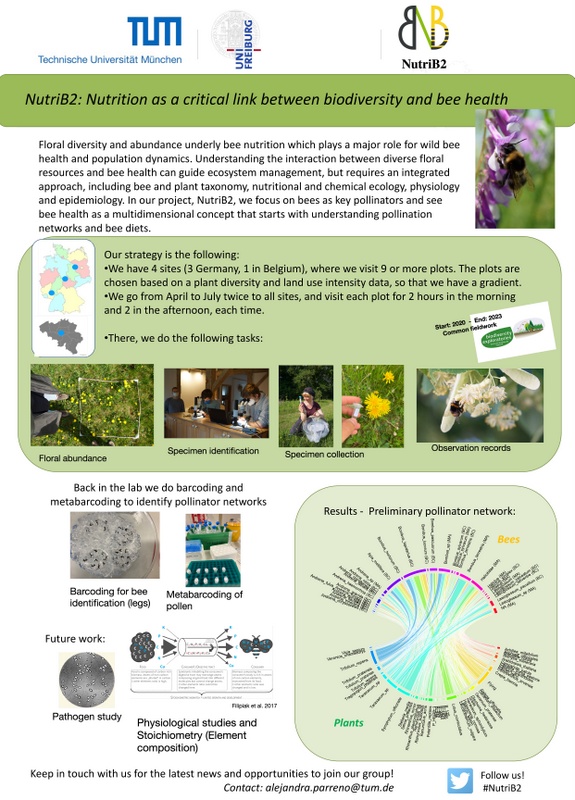NutriB2
NutriB2 (EU-BiodivERsA - research project)
Nutrition as critical link between biodiversity and bee health
 | |
Team: Prof. Dr. Alexandra-Maria Klein Dr. Dimitry Wintermantel Dipl. Biol. Anna-Maria Bleile Dr. Julia Ostermann Projectpartner: Prof. Dr. Sara Diana Leonhardt (TUM) | Duration: March 2020 - February 2023 Funding:
NutriB2 - BiodivERsA Project
|
Access to a diverse spectrum of food resources ensures appropriate nutrition and is thus crucial for animal health and fitness. Bees obtain nearly all nutrients from flowers. Their population dynamics are therefore largely determined by the availability, composition and diversity of flowering plants. Alarmingly, many bee populations are in decline in contemporary landscapes, likely due to the loss of floral resource diversity and abundance and to a decrease in the nutritional quality of floral resources. However, the actual link between floral diversity and composition, the nutritional composition of floral resources and bee health is still unclear, particularly in wild bees, which are considered even less resilient to environmental changes than honeybees. In NutriB2, eleven scientists from seven different countries combine their expertise in taxonomy, nutritional & chemical ecology, physiology, behaviour, epidemiology, biostatistics and modelling to, in a synergistic effort, clarify the link between floral biodiversity, nutrition and bee health. We elucidate critical nutrients and/or ratios and thus key plant species and compositions of plant species that cover the nutritional needs and support health of a large fraction of bee species. This knowledge is crucial for our understanding of how floral composition and diversity structure bee communities through nutritionally mediated health effects. It is also essential for designing and/or identifying and restoring habitats that support wild bee populations. |
Publications
- Leroy, C., Brunet, J.L., Henry, M. & Alaux, C. (2023): Using physiology to better support wild bee conservation. Conservation Physiology, 11: coac076. Link
- Parreño, M.A., Alaux C., Brunet J.L., Buydens, L., Filipiak, M., Henry, M., Keller, A., Klein, A.M., Kuhlmann, M., Leroy, C., Meeus, I., Palmer-Young, E., Piot, N., Requier, F., Ruedenauer, F., Smagghe, G., Stevenson, P.C. & Leonhardt, S.D. (2022): Critical links between biodiversity and health in wild bee conservation. Trends in Ecology and Evolution 37: 309-321. Link

